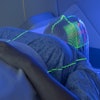For men with intermediate-risk, localized prostate cancer, five-session stereotactic body radiation therapy reduced patient-reported side effects compared with longer courses of therapy, according to study results presented September 30 at the American Society for Radiation Oncology annual meeting in San Francisco.
Unfortunately, the protocol didn't necessarily reduce future increases in prostate-specific antigen (PSA), the society noted in a statement. The findings came from the NRG Oncology GU005 trial led by Rodney Ellis, MD, of the University of South Florida/Tampa General Hospital.
"These findings provide important new evidence to help guide treatment decisions for patients with localized prostate cancer, a disease with typically high cure rates and long life expectancy," Ellis said in a press briefing. "The results help clarify what patients can expect from shorter versus longer courses of radiation therapy and enable more personalized treatment decisions based on individual priorities."
Each year, about 70,000 U.S. men are diagnosed with intermediate-risk disease confined to the prostate, and radiation therapy is the standard treatment option, with patients undergoing treatment in 35 to 45 daily sessions over seven to nine weeks, according to ASTRO. But recent studies have shown that a hypofractionated course of 20 to 28 sessions over four to six weeks is also effective. In light of this, researchers have been investigating whether stereotactic body radiation therapy (SBRT) can further shorten the therapy protocol while preserving high cure rates.
The NRG-GU005 trial assessed whether SBRT could outperform moderately hypofractionated radiation for both cancer control and patient-reported outcomes. It included 698 patients with previously untreated, intermediate-risk localized prostate cancer from multiple international centers; data were from between 2017 and 2022. Study participants were randomly assigned to receive either SBRT (36.25 Gy in five fractions, n = 353) or moderately hypofractionated intensity-modulated radiation therapy (MH-IMRT, 70 Gy in 28 fractions or 60 Gy in 20 fractions, n = 345).
Via questionnaires, the investigators tracked any patient-reported declines in bowel, urinary, or sexual functioning collected at baseline, 12 months, and 24 months after treatment.
Ellis and colleagues reported the following:
- Fewer patients treated with SBRT reported a decline in bowel function at two years post-treatment compared with MH-IMRT (34.9% vs. 43.8%; p = 0.034).
- Overall urinary quality of life was equivalent between the groups, but urinary incontinence was less common two years after SBRT compared with MH-IMRT (declines of 25.9% vs. 34.7%; p = 0.023).
- Sexual function scores were more positive after SBRT at one year compared with MH-IMRT (34% vs. 44%; p = 0.026) but were similar at two years (43% vs. 41%; p = 0.67).
However, disease-free survival rates were lower in the SBRT group, with 88.6% of patients being free from disease progression after three years compared with 92.1% of patients who underwent longer courses of radiation -- a difference "driven mainly by higher rates of … rising PSA after treatment, in the SBRT arm (7.8% vs. 4.2%; p = 0.037)," ASTRO noted.
"The PSA findings require careful interpretation," Ellis said. "With treatments involving larger doses per fraction, patients can experience temporary PSA elevations, or 'benign bounces,' that resolve over time. We need five-year follow-up to determine whether these elevations translate into actual disease progression."
The results underscore the need to communicate with patients about their treatment goals, according to Ellis.
"Patients have different priorities and values when it comes to their care," he said. "Some may prioritize convenience and minimizing impact on daily life, while others focus primarily on achieving the strongest possible cancer control measures. These results help inform those deeply personal decisions."




















